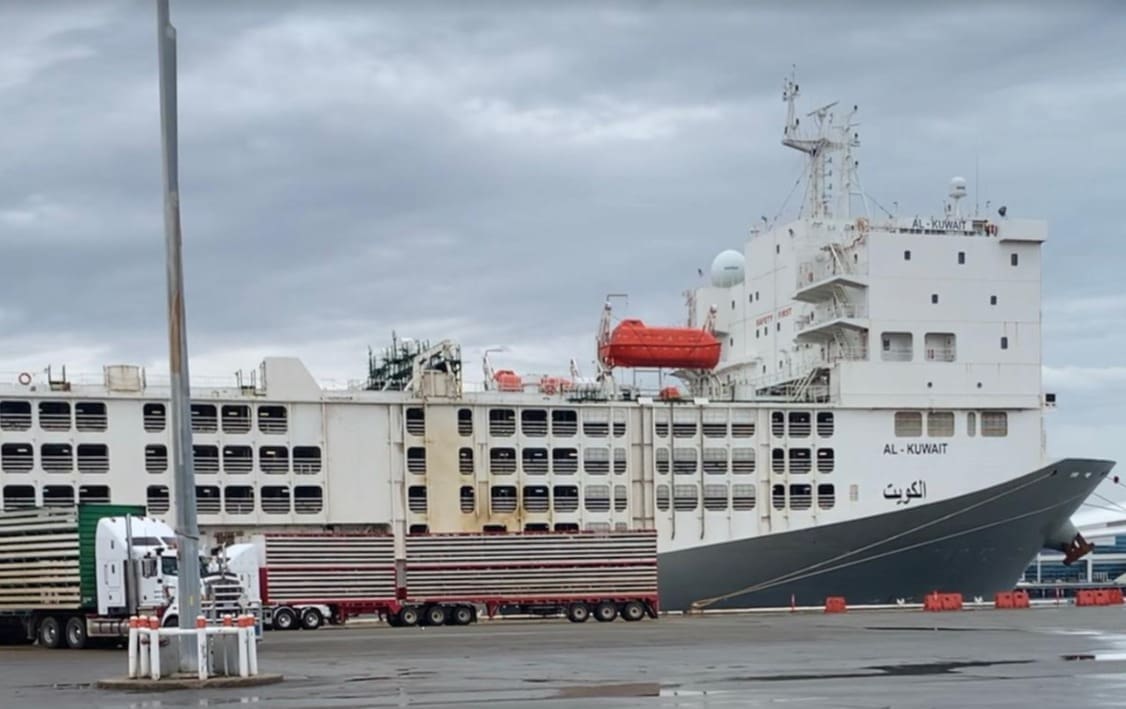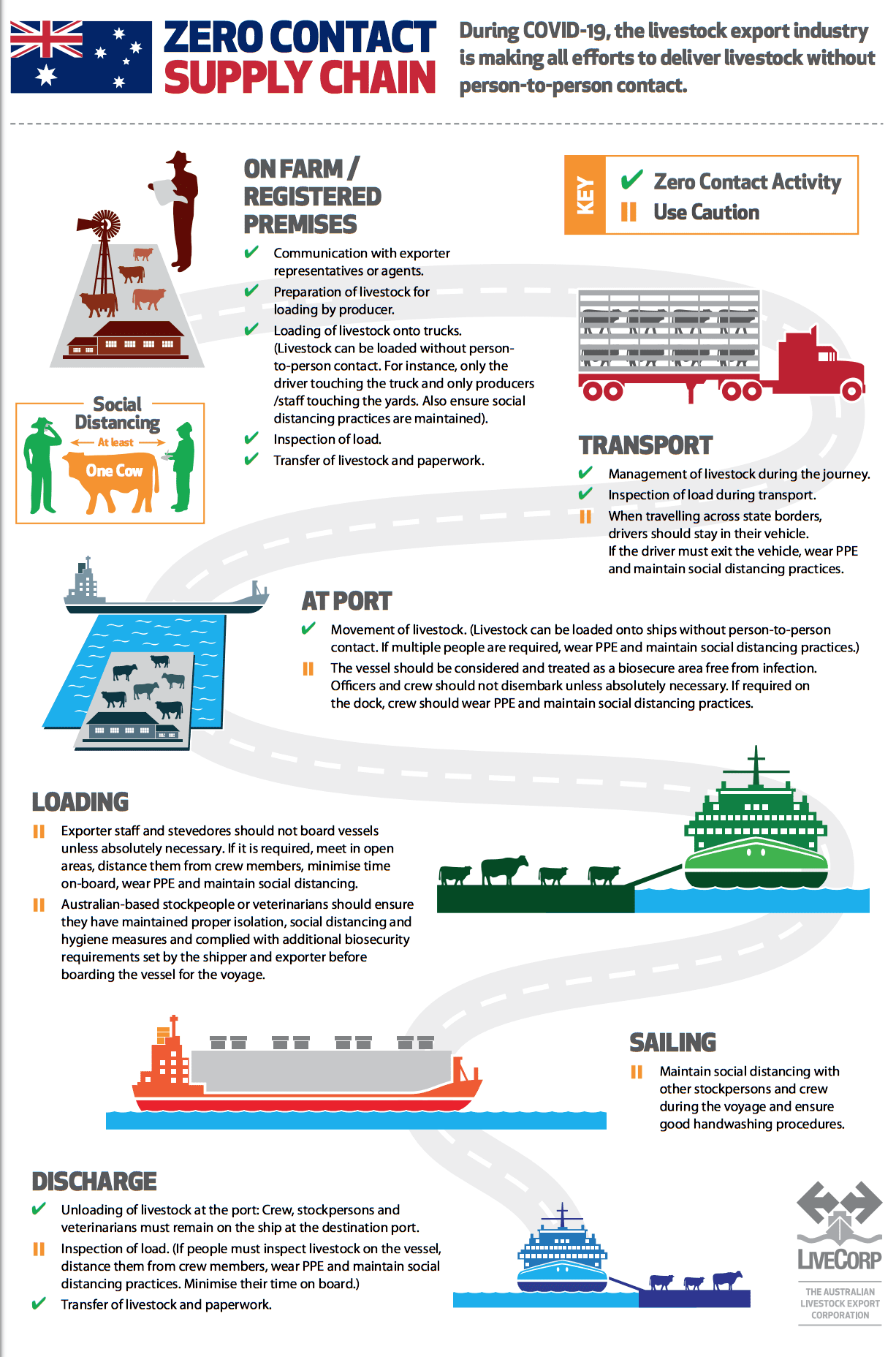SCRUTINY of procotols governing COVID-19 outbreaks on livestock export vessels continues as a cluster of positive test results from a cattle and sheep carrier docked in Fremantle grows.
 Three days after the Al Kuwait, owned by Kuwait Livestock Transport & Trading, docked in Fremantle last Friday to load 56,000 sheep for a return run to the Middle East, testing has confirmed that at least nine members of the 48 person crew were infected with COVID-19.
Three days after the Al Kuwait, owned by Kuwait Livestock Transport & Trading, docked in Fremantle last Friday to load 56,000 sheep for a return run to the Middle East, testing has confirmed that at least nine members of the 48 person crew were infected with COVID-19.
Two days before docking the ship’s master had notified the Federal Department of Agriculture — which oversees quarantine measures on the waterfront — that several crew members were sick.
The incident prompted a war of words between the WA and Commonwealth Governments over who knew what first and whether the ship should have been allowed to dock. However WA premier Mark McGowan has since conceded he “did not have the full picture” when he claimed the State had been left in the dark about a COVID-19 outbreak onboard a livestock export vessel about to dock in Fremantle.
As of this morning the cluster of positive infections from the Al Kuwait had grown to 9.
The WA Health Department yesterday removed 27 crew from the vessel to hotel quarantine with 15 essential crew remaining on board.
The Maritime Union of Australia has used the event to draw parallels to the Ruby Princess debacle which started the nation’s largest COVID-19 cluster after it was allowed to dock in Sydney in March carrying infected passengers who where then allowed to disperse back into the communtiy.
One key difference between the Ruby Princess and the Al Kuwait shipments is that all protocols were followed with the latter and no personnel have been allowed to disperse back into the community.
Howevert the MUA said the Al Kuwait event has highlighted “major flaws in Australia’s biosecurity, shipping, and health and safety regulations” and showed lessons have still not been learned.
“This latest coronavirus cluster reveals that five months into this crisis, and after repeated warning from the union and others in the industry, the Australian Government has still failed to properly address the major quarantine and biosecurity threats posed by international shipping,” MUA National Secretary Paddy Crumlin said.
“The dreadful lack of coordination between Federal and State agencies, with information not passed on in a timely manner to the port workers that came into direct contact with crew members on the vessel, demonstrates that the lessons of the Ruby Princess debacle still haven’t been learnt.
“The fact that this vessel notified Australian authorities two days before arrival of sickness onboard, but that information wasn’t passed on before it docked, shows the current system is broken.”
The MUA said immediate improvements to communication and collaboration between Federal, State and Territory Governments and agencies such as the Departments of Agriculture and Health, Border Protection, the Australian Maritime Safety Authority, and port authorities is urgently needed.
“If an outbreak of COVID-19 occurs among the limited number of pilots in a port, or wharfies and other waterfront workers, the port would quickly grind to a halt, forcing all trade to stop completely,” Mr Crumlin warned.
He said the nation’s biosecurity system also relied on crews working on foreign flagged vessels being paid as little as $2 per hour to self-declare any health issues with no proactive health checks before vessels are allowed to dock.
“It is clear that many of these vessels will not risk the delays and financial losses caused by self-declaring health issues, putting Australian maritime workers, their families, and the broader community at risk of COVID-19 infections,” he said.
Mr Crumlin the incident demonstrated that proactive regulation and inspections to ensure all vessels operating in Australian waters abide by appropriate biosecurity, safety, environmental and industrial laws.
Asked if the Al Kuwait issue is likely to have implications for the broader livestock export trade, Australian Livestock Exporters’ Council CEO Mark Harvey Sutton said the incident demonstrated protocols are working.
“The vessel did everything it should have, and it is the reason the cases were detected,” Mr Harvey-Sutton said.
“There has been no in intermingling with the community, they have been dealt with the health authorities and the crew have been looked after.
“The fact it was a livestock vessel which has so many stringent protocols in place is why it was picked up and that is what has happened, it is proof the procedures are working.”
He said ALEC and LiveCorp have been interacting with ship owners to ensure there are adequate protocols and procedures in place to minimise the risks of COVID-19 infection.
Under the protocols introduced in the early days of the COVID-19 pandemic there is no interaction between ship crew and the shore-based staff when ships are loading or unloading.
Mr Harvey-Sutton said there are points of potential interaction that cannot be avoided such as bringing a pilot on board a vessel to guide it into port. However there are steps that are taken to minimise that risk and ensure no interaction between the pilot and the crew.
In many cases the same crew have remained on the same vessel throughout the COVID-19 pandemic which has also reduced COVID-19 infection risk, which was the case with the crew onboard the Al Kuwait.
The exporter responsible for the shipment has released a media statement saying it is considering all possibilities of re-directing alternative vessels to Australia to transport the 56,000 head currently in a pre-quarantine export feedlot, as the MV Al Kuwait may have to remain in port for some time.
The Anna Marra, which is currently in Fremantle, will continue loading fodder before heading to Broome to load cattle destined for South-East Asia, as scheduled.
Mike Gordon, Managing Director, Rural Export and Trading (WA) Pty Ltd (RETWA) said “these are extraordinary times, and management plans are being developed to ensure the health and welfare of the sheep during the voyage.”
He said the sheep in quarantine are in excellent health, under regular veterinary inspections and ready to be exported.
“Animal welfare is always our top priority and an exemption request has considered all risks carefully to ensure all mitigating controls are in place”.
Mr Gordon said RETWA was committed to the welfare of the crew and was working closely with the WA Health Department.
The livestock export industry’s Zero Contact Supply chain procedures are described in the graphic provided by ALEC and LiveCorp below:


